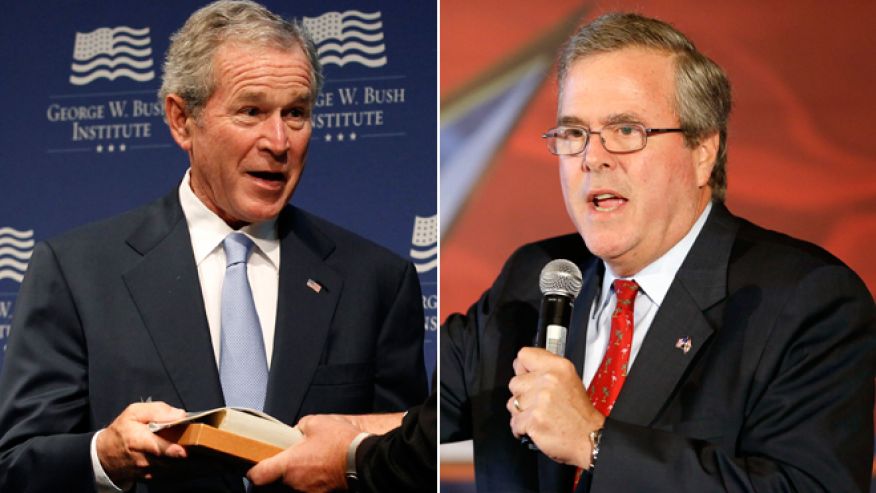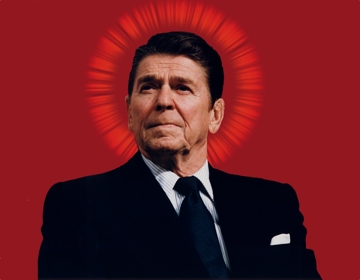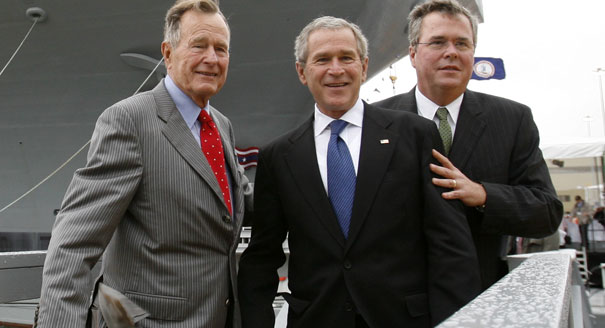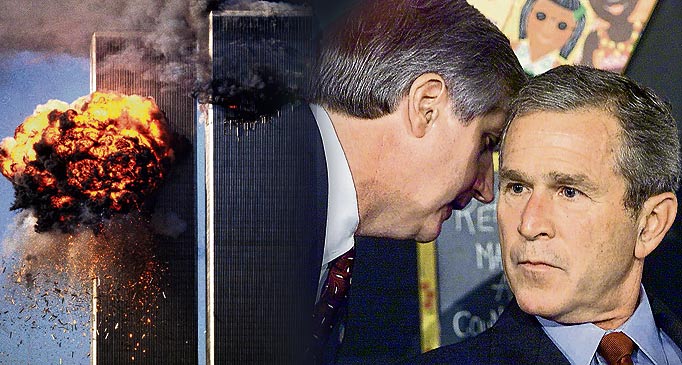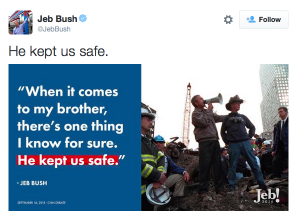Last month, just after the second Republican presidential debate, I wrote about Jeb Bush’s curious (to me) doubling down on his claim that his brother, President George W. Bush, had “kept us safe” from terrorism during his presidency.This was in response to goading from Donald Trump, who had the nerve in the debate to remind the viewers that it was Bush who was in the White House on 9/11.
Trump has been using this inconvenient fact to bludgeon Jeb ever since, forcing Bush to hold the line with the tenacity of a terrier. But it’s more than that now. As Peter Beinart writes at The Atlantic this morning, “It’s now clear: Jeb Bush wants to speak about his brother’s record on 9/11 as much as possible.”
And so Jeb continues to defend his brother:
In the latest episode of the reality show that is Donald Trump’s campaign, he has blamed my brother for the 9/11 terrorist attacks on our nation. That Trump echoes the attacks of Michael Moore and the fringe Left against my brother is yet another example of his dangerous views on national-security issues. … Let’s be clear: Donald Trump simply doesn’t know what he’s talking about.
It was not an exaggeration when Bush dictated to his daily diary that night that, “The Pearl Harbor of the 21st century took place today.” In some respects the attacks were more devastating. Instead of 1941 Hawaii, which was not then a state, the targets were the power centers of the homeland. Instead of Japan, the attacks were conduced by a shadowy enemy that had no country or visible army. Worse for Bush, CIA Director Tenet had explicitly warned him about the immediacy and seriousness of the bin Laden threat. Focusing on domestic issues and a giant tax cut, Bush had largely ignored the terrorism problem. “I didn’t feel that sense of urgency,” the president acknowledged later in an interview. “My blood was not nearly as boiling.”
But for Jeb, the real responsibility for 9/11 lies elsewhere, with Bill Clinton, W’s predecessor in the White House. In an interview with Fox News’ Sean Hannity on Monday, Jeb said:
I think there’s two ways to look at Islamic terrorism. One is a threat that has to be taken out as it relates to, you know, creating a strategy that calls it a war, or we view it as a law enforcement operation where people have rights. I think the Clinton administration made a mistake of thinking bin Laden had to be viewed from a law enforcement perspective.
Back to the historical record.
Richard Clarke was appointed by Bill Clinton as the first National Coordinator for Security, Infrastructure Protection, and Counterterrorism, and he continued to serve in that position under George W. Bush until he resigned in March 2003. The country’s top counterterrorism official, Clarke ran the Situation Room on 9/11. In his book, Against All Enemies: Inside America’s War on Terror, Clarke writes:
Clinton left office with bin Laden alive, but having authorized actions to eliminate him and to step up the attacks on al Qaeda. … He had seen earlier than anyone that terrorism would be the major new threat facing America, and therefore had greatly increased funding for counterterrorism and initiated homeland protection programs.
When Clinton left office many people, including the incoming Bush administration leadership, thought that he and his administration were overly obsessed with al Qaeda. After all, al Qaeda had killed only a few Americans, nothing like the hundreds of Marines who died at the hands of Beirut terrorists during the Reagan administration or the hundreds of Americans who were killed by Libya on Pan Am 103 during the first Bush’s administration. Those two acts had not provoked U.S. military retaliation. Why was Clinton so worked up about al Qaeda and why did he talk to President-elect Bush about it and have Sandy Berger raise it with his successor as National Security Advisor, Condi Rice? In January 2001, the new administration really thought Clinton’s recommendation that eliminating al Qaeda be one of their highest priorities, well, rather odd, like so many of the Clinton Administration’s actions, from their perspective.
So why does Jeb continue to toe the line? Well, it’s simple. The Bush name, and W’s legacy, isn’t the liability you’d think it is. Especially for Republican voters. A YouGov survey taken in September tells the tale.
In that poll, George W. Bush enjoys a 79% job approval rating among Republicans. When asked how good a job W did in “keeping the U.S. safe while president,” a whopping 81% of Republicans said his performance was good or excellent. Let that sink in for a minute.
Finally, when asked, “If Jeb Bush were elected president, do you think he would do a better or a worse job than George W. Bush?” 43% of Republicans said they thought Jeb would do just as well or better.
That’s the bottom line. Jeb has realized that his brother’s legacy is no liability, at least the voters who will decide the GOP’s nominating contest.
